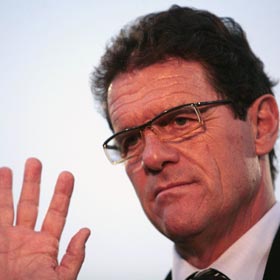
England’s impressive march towards the World Cup finals in South Africa next year has almost been taken for granted in the latter games of the qualifying campaign.
Think back to November 2007. The Wally with The Brolly. The shambles on the pitch. England down and out, failing to qualify for the European Championships.
Steve McClaren wasn’t solely to blame, but he was appointed to the job amid the hysterical furore for it to be given to an Englishman in the wake of Sven Goran Eriksson’s unexciting reign.
It was a foolish mistake, as history has proven, and one which thankfully the FA had no intention of repeating when they appointed Fabio Capello.
Around world football, like in no other sport, there remains a nationalistic hankering for the international manager’s job to be given to a son of the nation, regardless of whether he is the right man for the job.
It is further proof that although football is a multi-billion pound business, it is rarely run like a business.
In other industries, the man who gets the top job does so because he is the best man for the job, not because his most important reference is his birth certificate.
Argentina boss Diego Maradona was a populist but bizarre choice for a country that wants to win the World Cup. Legend he may be, but he is also troubled and lacks the coaching experience to take on one of the world’s most high profile teams.
Few were surprised when Argentina were so comprehensively outplayed by Brazil in their recent World Cup qualifier, and Argentina’s presence in Africa is now, unthinkably, severely in doubt.
In 2008, when Scotland appointed George Burley, he was on a shortlist of five, all of whom were Scots. After the disastrous Berti Vogts experiment, continuing failure appears to sit easier and criticism less ferocious when a Scots messes it up.
When the FA looked to replace McClaren, they found themselves in a similar situation to Scotland.
There was the usual amount of nationalistic jingoism underlined by the uneasy knowledge that there wasn’t an national really up to the job of winning the game’s greatest prize.
They took a brave decision and have never looked back. England haven’t won the World Cup yet, but look better placed to give it a go than they have for a long time.
For others more concerned about patriotism than football, it is a lesson they should take on board.




No comments:
Post a Comment